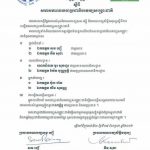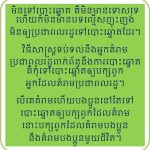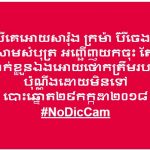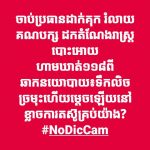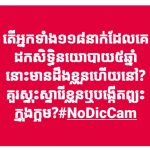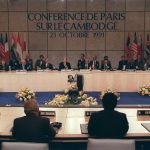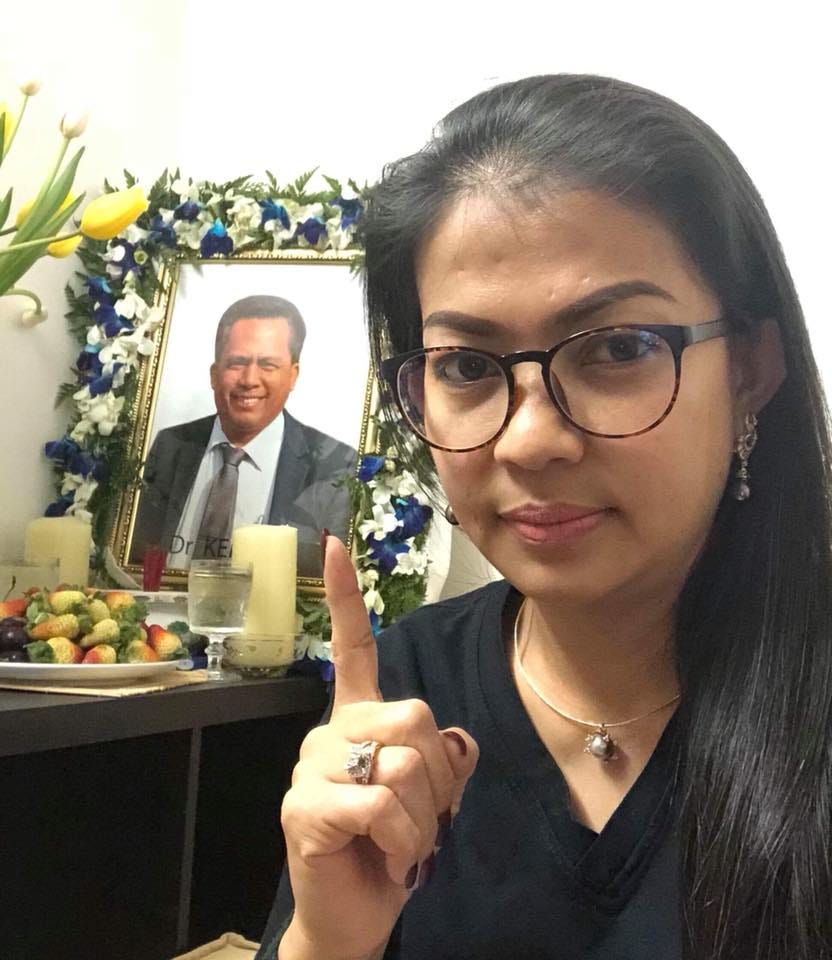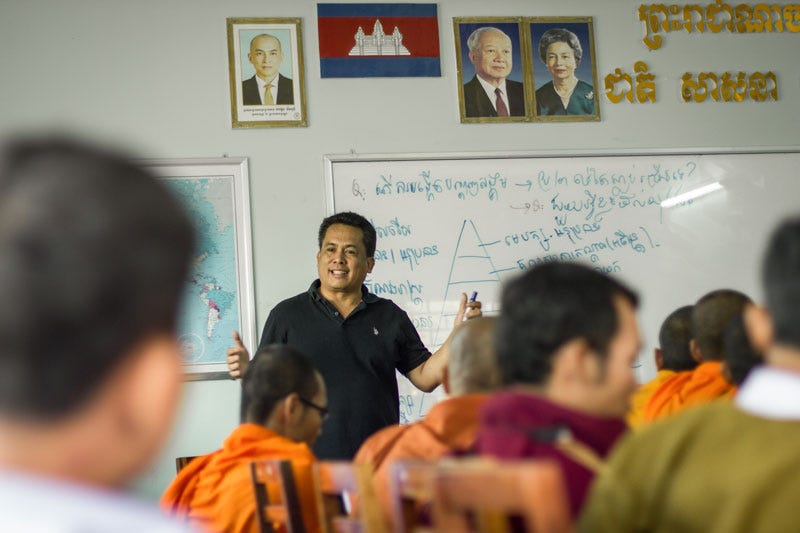View the stream on youtube on “Political Behaviour” of a “Populist Authoritarian” in Cambodia from a series of daily “Political Analysis on Cambodia Election 29 July 2018”
The Japan-China rivalry is playing out in Cambodia’s election
Reported by Nyshka Chandran, July 19, 2018
The United States and the European Union have suspended funding to the National Election Committee, which is meant to be independent, but is widely believed to be controlled by the ruling party. The United Nations, meanwhile, has warned that the election won’t be “genuine” and urged Phnom Penh to lift a ban on the CNRP, which is advising Cambodians to boycott the vote.
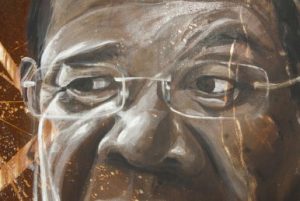
According to CNRP Deputy President Mu Sochua, Tokyo should withdraw its cooperation: “Cambodia needs to move forward, and it can only do so with democracy … that’s why we continue to explain to Japan that the only chance to help Cambodia is to side with democracy.”
The CNRP has tried reaching out to Beijing to explain its argument, but so far has been unsuccessful, Sochua told CNBC over the phone.
“To support Mr. Hun Sen is to support dictatorship and with dictatorship, no government can protect their investments,” she said, adding that “Mr. Hun Sen will keep giving more concessions to Chinese companies, so if Japan wants to protect its investments, it should stay on the side of democracy.”
In recent public comments, Japanese officials have urged Phnom Penh to hold free and fair elections, but didn’t touch on on the government’s human rights violations. Japan’s embassy in Cambodia told CNBC that Tokyo’s assistance was aimed at enhancing the credibility of the electoral process.
“Although Japan supports the technical and logistical aspects of the electoral process, they are not, at least in their own view, necessarily endorsing the legitimacy of the election itself,” echoed Deth Sok Udom, a political science professor at Phnom Penh’s Zaman University.
Ultimately, Abe may find he has to choose between maintaining economic power in Cambodia or upholding democratic standards.
“I suspect that Japan would opt for the first strategy,” Chambers said.
Continue to read more details by CNBC…
====
Hun Sen retains his tight grip on Cambodia, and freedoms can wait
Opined by Markus Karbaum, July 19, 2018
However, while the regime uses economic development as the main pillar for its legitimacy, most Cambodians are not part of the ruling CPP patronage network and hardly benefit from the economic rebound. Education and health care in the country are still considerably underdeveloped compared to most of its neighbours.
As pointed out by the Bertelsmann Transformation Index 2018, red tape and nepotism prevail. And Cambodia remains the most corrupt country in Southeast Asia, according to corruption watchdog Transparency International. These conditions contributed to the rise of the opposition CNRP as the regime has, so far, been completely unwilling to transform its governance style.
Instead of protesting against the growing social imbalance and the inefficient public sector, for years Cambodians have been migrating in increasing numbers. This trend has left many unable to find regular work abroad, putting Cambodians at the greatest risk among all Southeast Asians of becoming victims of human trafficking, according to the 2016 Global Slavery Index.
In effect, a population exchange has taken place, as initially Vietnamese and recently more and more Chinese citizens resettle in Cambodia, at least with the goodwill of the Hun Sen government.
Continue to read more details on South China Morning Post…
===
What has gone wrong in Cambodia?
Opined by Milton Osborne, July 19, 2018
As David Chandler notes of the political opposition at the time in his A History of Cambodia, “The royalist party soon lost its voice in decision making as well as its freedom of manoeuvre.”
Tired of the problems in Cambodia that had been exercising Western governments for more than a decade, no external players intervened to change the course of events. Similarly, there was never any sign at that stage that Moscow and Beijing had any interest in becoming directly involved in opposing the CPP’s actions.
The complex political history of the period from 1993 to 1997 is well documented in David W. Roberts’ Political Transition in Cambodia: Power, Elitism and Democracy. A disclosure: I reviewed this book for Pacific Affairs in 2001 and commented that it could be read as a justification for Hun Sen’s political behaviour. But I found persuasive, then and now, his endorsement of a view offered by long-term observer of Cambodia Steve Heder that the key players of the period – Sihanouk, Sam Rainsy, and Ranariddh – were all characterised by “deeply illiberal, anti-democratic and anti-pluralist tendencies”.
This lack of action in 1993 was followed by the unwillingness of external players to take any measures that mattered after Hun Sen’s brutal coup de force in July 1997 that saw the CPP overwhelm Prince Ranariddh’s FUNCINPEC.
Roberts tellingly quotes Henry Kissinger as asking rhetorically in 1998, “Why should we [the West] flagellate ourselves for what Cambodians did to each other?” Then UN secretary-general Kofi Annan claimed in 1997, shortly after Hun Sen’s coup, that the UNTAC intervention was “successful in helping to establish national institutions which could lead to stability and economic development”. This latter comment seems to typify the worst kind of readiness of an international civil servant to gloss over the realities of a complex set of circumstances.
The sanctions that followed the events of 1997, which included the US Congress cutting off aid to Cambodia and ASEAN postponing the admission of Cambodia to membership, also marked the beginning of Hun Sen’s ever closer relations with China. Having helped the Khmer Rouge for decades – before, during, and after the period of Pol Pot’s rule – Beijing now changed its policy and embarked on support for Hun Sen and the CPP, which continues to the present day.
It is China’s support that has enabled Hun Sen to weather repeated criticisms of his regime while building up the military strength that ensures his survival. The return for this Chinese largesse has been Cambodia’s reliable support for its foreign policy objectives, most notably in relation to the South China Sea. And Hun Sen has never ceased to contrast Chinese aid offered “without strings” with aid from Western nations tied to conditions.
Analysis of the 2013 national election, in which the CPP’s vote declined significantly, suggested that social media and the voting pattern of younger Cambodians had begun to play an important part in shaping political opinion. These facts might explain the serial courses of action that Hun Sen has taken to neuter any effective political challenge from his opponents, most particularly the dissolution of the opposition Cambodia National Rescue Party.
Everything suggests that Hun Sen has set his course and will not be deflected from it. In doing so he is showing himself more inclined to double down on authoritarian action than to reflect his little known chess playing abilities. And there is no reason to think any external player that matters will do anything to divert him from his present policies.
Continue to read The Interpreter…
===
Hun Sen is tempting fate in Cambodia’s election
Opined by Thitinan Pongsudhirak, July 17, 2018
Harsher measures from the U.S. and EU could target the Cambodian garment and footwear sector, which constitutes about 80% of the country’s exports. As they represent Cambodia’s largest export markets, the actions of the U.S. and EU have been tempered by concerns over the adverse consequences on Cambodian workers.
But if Hun Sen keeps continues to crack down after the election by further persecuting the opposition and violating human rights, the U.S. and EU might play hardball as well. This is what Sam Rainsy, another CNRP leader who lives in exile, has been urging.
Voter turnout will be critical in the upcoming election. The CNRP is trying to keep voters at home by promoting a “clean-finger” campaign, referring to the fact that ink is applied to the index finger of those who vote. While offering cash inducements to voters, Hun Sen has threatened yet undefined punitive measures for those who refuse to vote. After the election results are announced, China will likely give its automatic blessing, while Western democracies will demur. Japan will face a dilemma after providing election monitoring assistance.
Post-election Cambodia will resemble a simmering powder keg. Social unrest is possible in the aftermath, especially if turnout is low and coercion and violence are rife. Hun Sen is banking on the notion that growth and development can deliver to him elected authoritarian rule despite excluding nearly half of the electorate.
Demographic trends and social media pose a threat to Hun Sen. Two-thirds of Cambodia’s 16 million population are between 15 and 64 years of age, with another 30% under 15. The new generation born after the 1993 election is increasingly connected to social media. Registered Facebook users in Cambodia, for example, have doubled to 6.8 million in just the past two years.
The writing is on the wall for Hun Sen, but his battle-hardened instincts will be to fight tooth and nail to remain in power. Even as he resorts to increased manipulation and repression, Cambodia’s young electorate will become more agitated while Western condemnation intensifies and the political opposition rallies from outside the country.
China therefore should realize that its coddling of Cambodia’s elected dictator does not fit well with Beijing’s aspirations to become a responsible global leader. Hun Sen would be better off reviving the U.N.-led power-sharing plan of 25 years ago which mirrored the country’s popular will. His deeply flawed election this time is likely to set the stage for his demise down the road.

